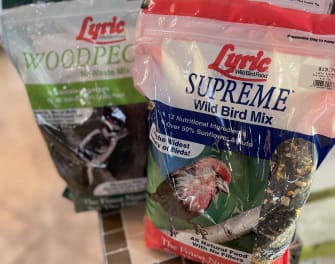Wild birds, just like other creatures, need proper food to survive and thrive—and, in New York, you’ll likely see cardinals, finches, woodpeckers, tufted titmouses, and much more. Just like people, each bird species has unique preferences in what they eat. So, if you know what kind you’d like to attract, let the experts at Decker’s Nursery know and we’ll be happy to make bird seed recommendations.

Types of Bird Seed
Numerous options exist and here are some recommendations to consider.
Sunflower Seed
In the bird world, this is the most in-demand food rated number one by the U.S. Fish and Wildlife Service, with the black oil sunflower seed being the cream of the crop. The black oil sunflower bird seeds come with more meat along with softer, easier-to-crack outer husks. This makes it easier for smaller birds to open the shell and provides them with more reward for their efforts.
Nearly every kind of wild bird enjoys eating black oil sunflower seeds, from jays to sparrows and from blackbirds to chickadees, finches, cardinals, and so much more. That’s probably because this type of seed, which comes from the sunflower, Helianthus annuus, resembles so much of what birds eat in the wild, including seeds from a wide range of trees and flowers.
Sunflower seeds can be placed in a broad range of feeder styles, making it easier on you, and you can feel good about the high levels of nutrition found in this wild bird food. At Decker’s Nursery, we offer sunflower seed products with seeds that are carefully selected and already cleaned.
Nyjer
Nyjer provides plenty of nutrition to the multiple bird species that are attracted to this seed. High in protein and fiber, it also gives wild birds the iron, calcium, and other nutrients they need. Nyjer seeds are so tiny that one single pound can contain about 130,000 of them. This wild bird food tends to attract finches and other small, active species and works best when placed in a bird feeder that’s designed to provide this kind of food.
This choice can be especially beneficial in the winter because it provides the extra boost of energy needed by wild birds while also being ideal for year-round use. As a bonus, squirrels aren’t usually interested in nyjer, which saves it for the birds you want to nourish.
Suet Cakes
Suet cakes can be perfect to provide wild birds with high levels of nutrition and energy. Besides containing bird seed, these cakes are shaped through the use of beef fat. In quality suet cakes, the fat is melted down and then skimmed to remove impurities. The result is pure suet that’s used to make nourishing cakes of food for the wild birds that visit your yard, a type of bird food that’s quite beneficial, especially in the colder months.
Suet cakes attract a wide range of bird species, including finches, jays, wrens, chickadees, even robins and woodpeckers and more. You’ll want to select a wild bird feeder that works well with suet cakes (we can help!) and, because we offer no-melt suet cakes, you can buy in bulk to save time without having to worry about waste.
Mixed Seed
Different birds have different food preferences and, when you offer mixed seed, you’ll be providing a variety of seed kinds all at once. This, naturally enough, can attract a mixture of bird types to your property. Don’t be surprised when you see birds sifting through to enjoy their favorites! That can happen.
Hot Meats
First, let’s compare bird taste buds to those of humans. People have about 8,000-9,000 of them while birds have 50 to 100. They actually can’t “taste” spice in the way we do or feel the hotness of spicy flavors. Why? Their biological systems can’t create capsaicin, which is the chemical that provides the burning sensation in the mouths of people who eat spicy foods.
So, wild birds can enjoy hot foods without fuss—and, better yet, spicy mixtures usually cause squirrels and other animals to say “no, thanks,” leaving hot bird seed for your winged visitors to enjoy, year-round.
What Else Wild Birds Enjoy
To attract birds, consider what trees, shrubs, grasses, berries, and flowers you’re planting—and consider other bird supplies, such as a birdbath to provide them with a reliable water source. In the winter, warm it up so they can quench their thirst after a meal.
Wild Bird Food Caution
Well-intentioned people may think about leaving their leftover bread and stale cookies, potato chips, and salty peanuts out for birds to enjoy, but they shouldn’t give into those impulses. Salty foods can cause bird bellies to swell. Other food types that shouldn’t be offered to birds include milk, large pieces of bread, honey, raw meat, or any spoiled/moldy food, including old wild bird seed.
If someone offers you bird seed they’ve had for a while, check to make sure it’s dry with no strong odor. If the seed clumps together or includes sprouts or mold, discard it. Damaged or poor quality seed can be harmful to the wild birds you’re trying to help.
Choose Decker’s Nursery for Your Wild Bird Food
We offer a large selection of premium wild bird seed that will be perfect for the kinds of birds you want to attract. Just let us know your goals and our experts will be ready and willing to help. We can also provide bird feeders, birdbaths, and plants that will make your yard an inviting environment for birds—as well as feeding, planting advice, and much more. Stop by our retail garden center, contact us online or call us at 631-261-1148.
